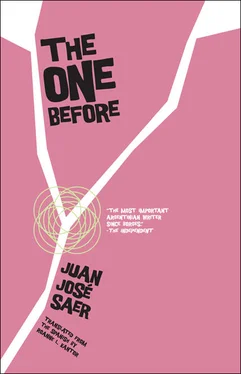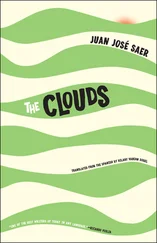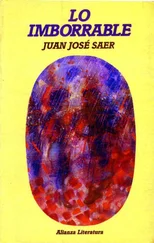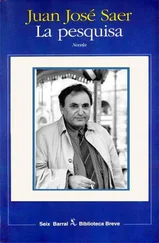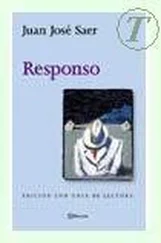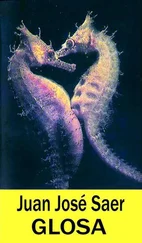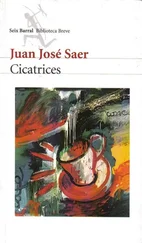In the interior, these days, you can’t be an empiricist, even if you have reached the age of sixty-six and teach philosophy classes at the University. I say that you can’t be an empiricist for this reason especially, most especially if you have three children (the eldest also a professor of philosophy, but in Canada), eight grandchildren, and a wife who follows you around the whole blessed day with wool socks, because she knows that at this point catching cold can be deadly. And nevertheless, it is old age, I think, that has made me an empiricist, because I prefer a world that is reborn every moment, whole, to a past that resembles an abandoned factory where minutes sprout like weeds among the debris and the machines. I corresponded with Francisco Romero for years but I never dared to tell him that his humanism seemed crazy to me — the writing hand advances now from one side to the other and will keep going and is filling this great white space with signs — that everything existence assumes about the past is nothing but a delusion, beneficial in certain cases, I’ll admit, but in the end a delusion. To me — oh how the boys would laugh if I said this in class — nothing exists but the present (not today, because “today” is too “broad” a concept for the idea I have of the present): my hand lifted in the air, now, that hangs at the height of the lamp (hanging, lamp, and height are three separate presents, each absolute, and only laziness makes me pull them together into a single sentence), and the room to one side, the bookcase that is behind me is nothing more than a delusion. It is my philosophy. It would be dishonest to explain it systematically. What’s more, for me there is no relationship of cause and effect (there is nothing more than a whole universe that plunges, whole, into nothingness and then reappears, plunges, whole again, and reappears infinitely), and it is the cause and effect relationship that serves as the skeleton for all philosophic discourse, including those who propose to negate the relationship of cause and effect. Cicero, Saint Thomas, Kant, and Hegel, that pretentious Frenchman who went to Holland to look for the “cogito,” are nothing more to me than sparkling specters whom I consider so little that they can’t scare me. Sometimes I sense in a smell unfurling before me the phantasmagoria of a past so vivid that for a moment it makes me waver. But then I reflect that I have done nothing more than sense a new smell, of such a particular type that it awakens sensations that evoke memories, but that are not memories themselves, simply because there is nothing to remember. The philosophy students know me for my love of grilled fish and white wine, for my affability and some rough and poorly made socks that my wife makes me wear all year round to stave off the cold.
A small silver cup of mate comes and goes from my worktable. Sometimes the last one goes cold on the pedestal. My study is a knot of cool semidarkness, fortified by books against the summer that sparkles behind the orange curtains. My greedy eye incessantly retraces daguerreotypes of full-grown men and oil paintings representing soundless, immobile battles. The life of those multitudes, has it been richer or more raucous than this life of mine, which fades away as my body atrophies within these four walls? Sometimes, a perfect, unexpected fragment unfurls and expands beneath my eyes, a report from San Martín, a letter, happy diamonds from an epoch of sun and blood. Mostly, however, there is nothing to do but copy documents from the archives and cobble together evidence that will exchange one glory for another on the overcrowded horizon of death. And most of all, the tension of ensuring that this nightmare that has fanned out behind me — and why do I say behind? — doesn’t evaporate and isn’t erased.
I work deep into the night before heading to bed. Whatever pretext serves to delay each night a little more. But at last there are no more excuses and I am undressing slowly, I am putting on my pajamas, and I am laying myself out next to the bulk of breathing heat that is the sleeping body of my wife. The procession begins immediately, the mute creaking of insomnia, interwoven with changing forms that assault me and never leave until daybreak. Almost always, it ends with increasingly wild disintegration, whose final phases I forget most of the time, or perhaps I’m already asleep, or perhaps I believe that I’m already asleep, or perhaps I’m absorbed in a thought of which I’m not conscious, but that nevertheless I believe I understand. Yet, despite everything, none of these is the worst. Some nights it’s not dreams that follow insomnia, but blind lucidity, an incandescent vigil, that is no sort of lucidity at all and a vigil for nothing. Having reached that point, I feel emptied of memories — I, for whom memory is the masculine arm that parts the waters and, at the same time, the turbulent river whose bottom keeps receding, even as one plunges deeper — and with nothing to think about. Then, in the lilac sky, the white pinpoint of the moon begins to rise slowly and sparkle against the metallic curtains.
I ate the foods of the world. My hand touched the stones of famous cities and my body, shriveled now but fit and feral, walked streets more numerous than the ripples in a river. What man have I not known? What book have I not read? What might there be in the warehouse of visible and invisible things that could still be sold to me as a novelty? In the mornings of the month of October, full of sunlight and pigeons, I contemplate the slow explosion of peach blossoms and I stroll leisurely along, enjoying good digestion and good respiration, the taste of coffee on my tongue and a lit cigarette between my fingers. I had to go through all of that, the long night of desire and possession, to get here.
My mind hammers strange iron verses. They echo in me as if for the first time. Beauty, which for Plato is reminiscence, for me, defenseless and free, is nothing but immediate reality. The same alliterative music makes me shudder again, each time, with resplendent delight. Coffee: a shadow compared to its aftertaste, with its perfumed heaviness now subtly radiating from the tip of my tongue. What saves us now, we old people, is to see the world burning behind us, seated on a blazing bed of ash. Upon that mattress I sit and contemplate my own shadow as the morning makes it slowly shrink away.
Today I hope that others enjoy the miracle of birth and the flavor of their first perfumed presentation to the world, or of the throngs of people at a party at night. To a blind man the sun is blacker than night, and the ideal birth is death. My light is unique. I cannot change it. And the smoke from my cigarette is bluer and more solid than a cluster of cities.
A friend of mine, a writer, having discovered his wife was cheating on him with a bank employee (when usually it’s the wives of bank employees who cheat on their spouses with writers), left his house one day and after wandering in the mountains for a while, working at a newspaper in Mendoza, The Andes , I think, and living off the beneficence of a wine merchant who supported poets and painters, disappeared completely, without dropping the smallest hint to me or to any of his friends about where he might be, until one morning in March when I was obliged to get up early (I live on the outskirts of the city, in the Colastiné Norte), when I opened the front door and suddenly found myself facing a man on horseback, who told me he was passing through the local post office and, when he mentioned he was headed in the direction of my house, had collected a letter for me that had been gathering dust at the post office for more than two months — it was airmail, because the fine paper envelope was bordered by red and blue stripes, and when I opened it I found that it held a postcard — Hans Memling’s Sybilla Sambetha —on the back of which my friend, from Bruges, Belgium, had written to tell me that he was very well, that he felt 10 years younger, and that he lived with a tiny Japanese woman who never spoke a word and who had learned to brew mate .
Читать дальше
